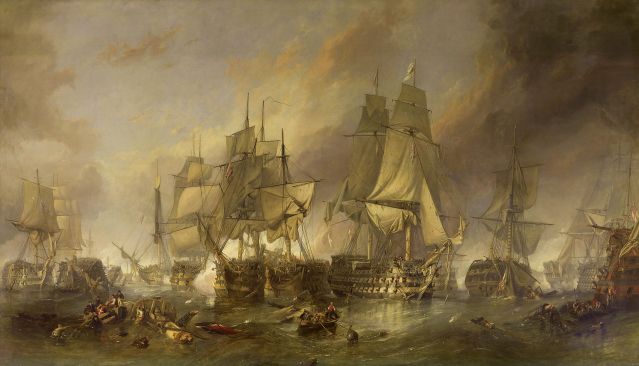Leadership
Leadership Lessons From Admiral Nelson
What today's managers and leaders can learn from this legendary naval figure.
Posted August 27, 2024 Reviewed by Michelle Quirk
Key points
- Work, like battles, is often messy, and managers cannot be everywhere at once.
- What leaders must do is equip their teams to operate in unpredictable contexts.
- Clear communication, buy-in, and focusing on ends over means are essential tactics to optimize team output.
When considering what makes for an effective leader, let us contrast the approaches of two famous admirals.
On April 17, 1780, British Admiral George Rodney moved toward the French navy just off Martinique in the Caribbean. Rodney had the French fleet exactly where he wanted it, and—having signaled instructions for the attack to his fleet—his own ship Sandwich began the assault and tore through the French line. But then things quickly went wrong.
Rodney’s officers commanding the rest of his ships had not fully understood his intent or his signals. As they began to take what they believed were his desired maneuvers, one followed the other… yet this led to actions far removed from what Rodney had intended. In the end, Rodney found himself abandoned, with severe damage to Sandwich, realising a golden chance to inflict a crushing defeat had been wasted.
Rodney was furious. He thundered at "the dastardly behaviour of a fleet which called themselves British." Reading about the battle, I was struck by the parallels between Rodney’s frustration and that of managers and leaders I have witnessed in the corporate world who express and obviously feel contempt when instructions are not perfectly obeyed.
With the benefit of hindsight, though, in many ways, Rodney only had himself to blame. He may have been in possession of a brilliant plan, but he’d kept it too close to his chest, failed to communicate clearly, and neglected to prepare his officers to respond and act according to the intent of his scheme in the chaos of an 18th-century naval battle.
Admiral Rodney would, in the end, have better days: Indeed, his masterful defeat of the French in the little-known Battle of the Saintes (1782) came at a crucial moment after Britain’s loss of the American colonies. But his fame, and his merit as a leader, are rightly eclipsed by that of the admiral immortalized in London’s Trafalgar Square, Horatio Nelson.

The diminutive Nelson was a celebrity of his time, and his fame has continued ever since. With Britain under severe threat of invasion by Napoleon, each of his several major victories was greeted at home with outpourings of understandable relief and admiration. He had many of the more obvious trappings of a military hero as someone who led from the front to the end, despite having lost an arm and vision in one eye. Such bravery would ultimately lead to his mortal wounding at his masterpiece, Trafalgar, and the sanctification that followed.
But lesser-known attributes that made Nelson such an effective leader, on closer inspection, are worth studying: and they offer valuable insights for today’s leaders and managers.
Key to this approach was his appreciation of the complexity of battle, and what he could and couldn’t control as a leader. A parallel, then, with a sales manager who cannot be present in (or perfectly predict) every sales call. Nelson realized he couldn’t simply direct and command his men; rather, he needed them to understand simple plans and, above all, his overall intent, and be prepared for inevitable contingencies.
Famously, Nelson was far from aloof—and while contemporaries vilified Rodney’s "tyrannical" leadership, Nelson was quite the opposite. He took significant time to get to know and build relationships with his captains, inviting them frequently to dine with him on his flagship HMS Victory and giving them an opportunity to understand (and even debate) his thinking and approach. The phrase "band of brothers," now associated with the World War II TV series, was, in fact, coined by Nelson when discussing his fellow officers—and the feeling was mutual.
Communication Tactics
Even more specifically, it is instructive when considering leadership lessons from Nelson to explore how he communicated with his "band."
Firstly, he kept his plans simple and easy to understand—and shared them early and often. The plan that would be his best-known triumph at Trafalgar was bold and highly unorthodox, involving as it did using two columns to attack the French and Spanish fleet from the side. But, bold as it was, it was also straightforward, and Nelson’s band of brothers could quickly grasp it and understand their own role within it.

Not only did Nelson share his plans but he also made an effort to embrace feedback. This secured buy-in from his officers, who felt their views and experiences mattered, and helped to road-test a plan, too, as he allowed debate to range over multiple possibilities and eventualities. In this way, Nelson prepared his team to be able to think and react during the heat of what would inevitably be a chaotic battle, rather than seek his guidance as soon as things got tough. The result was critical to the British success at Trafalgar, not least given Nelson’s fatal injury.
Today’s leaders and managers must recognize, like Nelson, that their people are not simply extensions of themselves, and that perfect direction is often unrealistic. Projects and initiatives, customers and prospects are unpredictable. The stakes, of course, may be different, but Nelson understood what every manager must understand, too: that leaders cannot and should not attempt to be everywhere all the time, and support and guidance often cannot be instantaneous.

Instead, being an effective leader relies on simple and clear instructions, the active pursuit of buy-in, and also on giving people the trust and belief to carry out such instructions in their own way. Indeed, Nelson would have approved of what today is called "outcome-oriented management": making ends (or strategic intent) crystal clear and placing their achievement above the means of getting there.
Taking Nelson’s approach, leaders can achieve what a more recent military figure, Admiral McRaven, refers to as a real "team" and not just a "command"—a group of people who, far from automatons, are equipped both practically and emotionally to achieve results that ultimately drive leadership objectives in invariably messy contexts.




